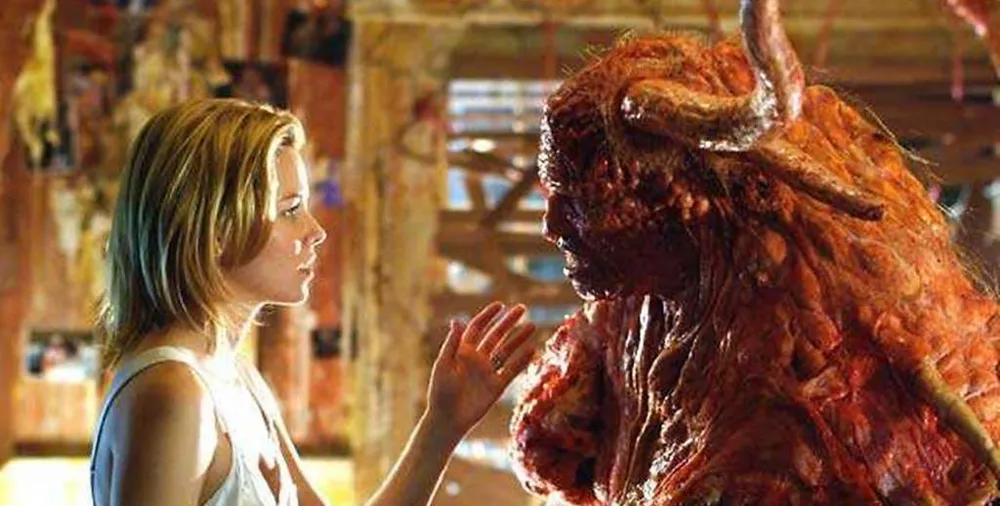
James Gunn was my first favorite director. And while I know this statement is likely a testament to both my young age and not falling in love with cinema until my late teens, in many ways, I’m glad it took me so long: Gunn’s a perfect first-favorite filmmaker—and Slither (2006), his slimy high-quality B-movie about alien world-eating worms and monstrous masculinities, is arguable the first film in his filmography where his kitsch reaches something tangibly auteur. I don’t mean to use the much overused “A-word” in a qualitative or evaluative sense, but as a benchmark for a unique visual and sonic experience that gives away a Gunn movie. His art bears a certain trademark after Slither.
Much like Quentin Tarantino, David Fincher, or Sofia Coppola, the films of James Gunn are easily artistically digestible. Young viewers latch onto filmmakers like Tarantino because they see, for the first time, the effect of a low-angle or a Dutch angle—they understand the basic language of film in a way previously elusive. It’s also no coincidence, I’d argue, that these filmmakers (especially Tarantino) love talking about their own movies in revealing and vulnerable ways other directors sometimes disdain. These factors, combined with the plethora of critical material available online and their ostentatiously interesting filmmaking, are why so many film lovers start with Pulp Fiction or The Virgin Suicides. For the same reasons, I started with Slither, Super (2010), and yes, Guardians of the Galaxy (2014).
The ultramasculine misogynist Grant Grant (Michael Rooker) is the film’s most vile parasite, even more so than the sexual innuendo aliens that take his body over. He forces himself upon his wife, seduces his high school flame, and sees very little wrong with a dependency on violence. Manipulative and cruel to his wife, he’s a man controlled by his Id, dominated by hollow pleasure; to use a phrase from C.S. Lewis, he’s a virtueless man with an “empty chest.” (And that chest is literally emptied and replaced by an alien lifeform that seems to exaggerate his primal urges and internal emptiness.) “But it’s my nature, isn’t it? You can’t blame someone for acting according to his own nature,” he says to his wife Starla Grant (Elizabeth Banks).
The visual and sonic trademarks are all here, only truly identifiable in retrospect. 1980s pop music, brutish creature designs, unfiltered humor (which eventually matures), and careful colors are the most obvious, but also present are his economic special effects, misogynistic anti-heroes, Christ figures, and a refusal to allow the “hero” to “obtain” the damsel in distress by the film’s conclusion. On the latter, Slither might be his most blatant refusal of the action-movie trope. Not only does Starla overcome domestic violence to free herself from the Jabba the Hutt version of Grant, but she never entertains a romance with Police Chief Bill Pardy (Nathan Fillion), the somewhat manipulative “nice guy” who proposes an illicit affair to ameliorate her marital displeasure.
At the film’s beginning and after watching a goofy-looking meteor fall toward Earth, two hillbilly cops with minor roles seem to be having a rather mundane evening policing their rural town. “The whip-poor-will flies about 27 miles an hour,” one says to the other. “Hmmh,” his more disinterested co-worker replies. “Is that what you think it would have been?” “Sure,” the other replies. “I would have thought like 31 or something, 32.” The meteor crashes while the cops bicker, unphased, about birds.
The distracted, quippy, and almost campy sense of humor in the opening line might seem harmless, but I’d bet it’s a more influential line than it seems on the surface. Based on the chronology of his filmography, Gunn’s audition for a part in the Marvel Cinematic Universe would come through Slither and his superhero satire four years later, Super. And while this is almost a full decade before his Guardians of the Galaxy, one can’t but help already hear the sense of humor that’s spread like chickenpox across the MCU. The Guardians’ Drax, Robert Downey Jr.’s Tony Stark, Paul Rudd’s Ant-Man, or virtually any character in the later Thor movies could remark something dumb and tonally setting about the speed of a bird and it wouldn’t seem out of character. This opening line is a taste of the humor Kevin Feige liked in Gunn—and that same humor, to some regret and overuse, outlives Gunn’s welcome in the MCU.
Is Gunn to blame for the MCU’s fallings post-Guardians? Probably not, but his films certainly altered the trajectory of the superhero franchise in one way or another. Do with that what you will.
Slither
2006
dir. James Gunn
95 min.
Screens (on 35mm!) Monday, 10/24, 4:45 and 9:00 pm @ Brattle Theatre
Part of the series: Strange Invaders

